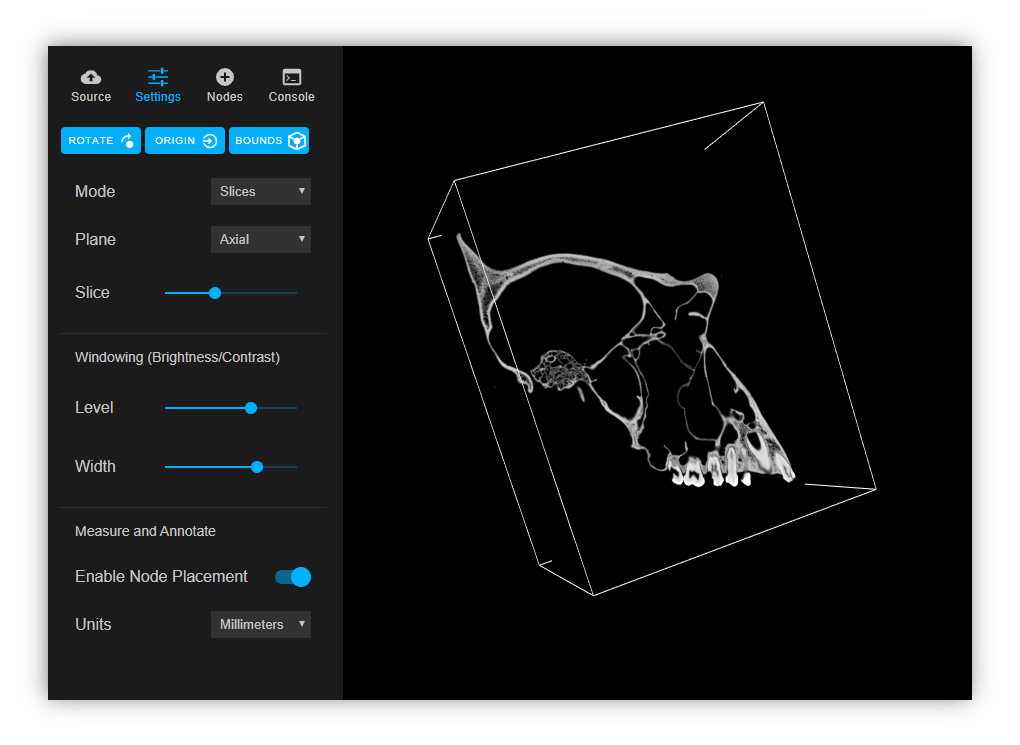
Aleph
Website
Visit the Aleph demo page to try it out.

Scope
- Usable as a web component within any page/framework and has a Universal Viewer integration
- Has a supporting Control Panel (a separate web component) showing associated settings for a given mesh or volume
- Straight-forward to debug, using a single source of truth and unidirectional data flow (redux)
- Themable to allow customised colour schemes (css variables)
- Encapsulates 3D rendering logic in a well-defined component model, with pre-existing community support/adoption (A-Frame)
- Utilises the component model to extensibly display 3D media file types (GLTF+DRACO, DICOM)
- Renders 3D scenes declaratively, decoupling the presentation layer from the application layer
- Permits annotation of points on a 3D mesh or volume with a title and description
- Permits measurement of lengths and angles, with the potential to be extended to areas and volumes
- Permits annotation/measurement data to be stored/retrieved as json
- Permits slice and volume views of volumetric data, with axis/slice selection and point cloud windowing controls
- Permits panning, rotating, and animated transitions between annotations/measurements
- Has "in-scene" annotation/measurement tools as opposed to overlaid, permitting future AR/VR/XR use cases
Getting Started
Clone the repository and run npm install
Dev Builds
For development with readable sources and hot reloading run:
npm run build:dev
Production Builds
For minified production builds run:
npm run build
View on localhost
npm start
Contributing
Read below to learn how to take part in improving Aleph:
- Fork the repository and run the examples from source
- Get familiar with Code of Conduct
- Read our guide to contributing
- Find an issue to work on and submit a pull request
- First time contributing to open source? Pick a good first issue to get you familiar with GitHub contributing process.
- First time contributing to Aleph? Pick a beginner friendly issue to get you familiar with codebase and our contributing process.
- Want to become a Committer? Solve an issue showing that you understand Aleph objectives and architecture. Here is a good list to start.
- Could not find an issue? Look for bugs, typos, and missing features.
Feedback
Read below how to engage with Aleph community:
- Join the discussion on Slack.
- Ask a question, request a new feature and file a bug with GitHub issues.
- Star the repository to show your support.
Documentation
Web Components
Aleph can be used to display GLTF files and DICOM series. GLTF can be used in conjunction with DRACO compression.
To annotate/measure an object, open the "Settings" tab in the control panel and check "Enable Node Placement". Clicking on a 3D object will create a node which can be given a title and description. Nodes can be used as points of interest or can be connected via edges. With a node selected, SHIFT + Click to create an edge between that and another node. Edges can be used for measurement and can also be labeled with a title and description. Units of measurement can be changed in the control panel. SHIFT + Click between edges to measure angles.
The two top-level web components are <al-control-panel> and <al-viewer>. <al-control-panel> wraps a tabs-based interface containing <al-url-picker>, <al-settings>, <al-graph-editor>, and <al-console>. <al-viewer> contains the A-Frame scene and all 3D rendering logic. It also contains a Redux store that acts as single source of truth for the viewer and control panel. <al-viewer> can be used independently of <al-control-panel>, which can be lazy loaded to provide additional options.
License








